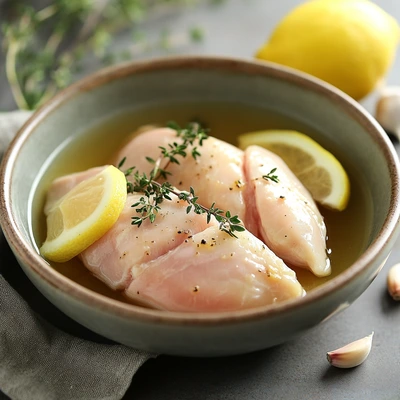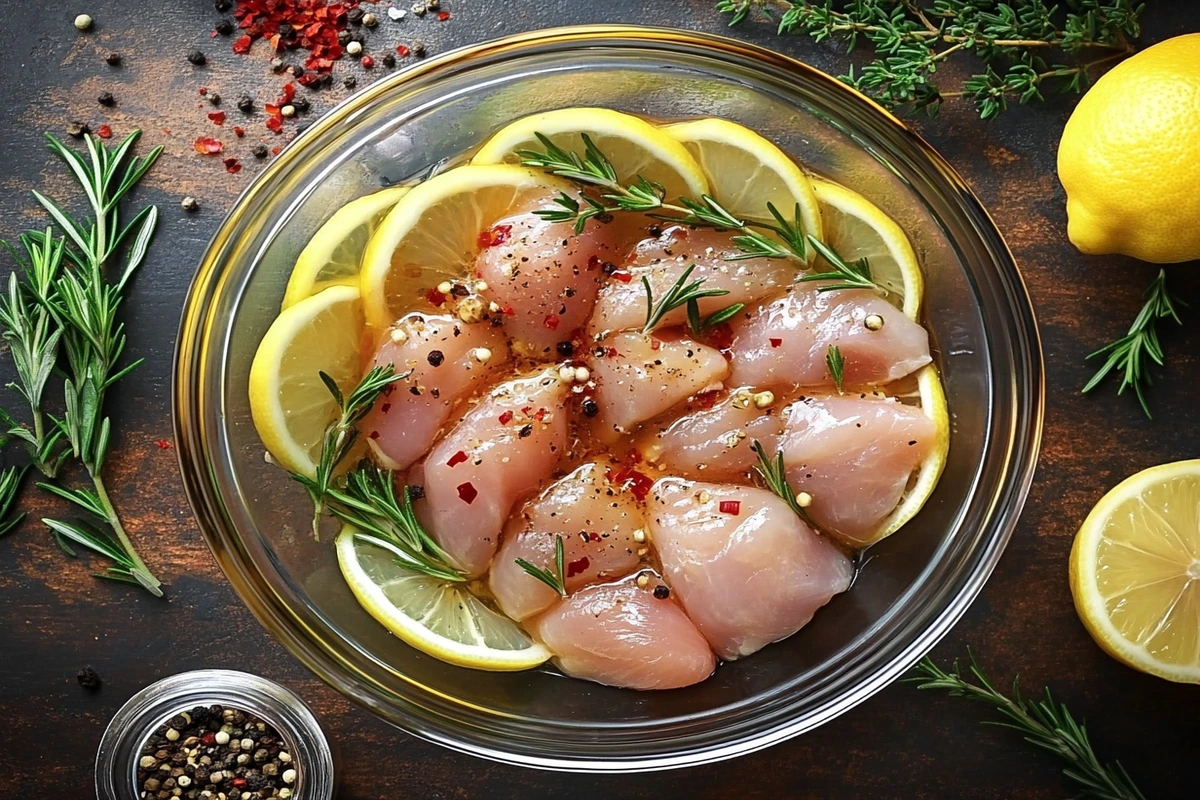Cooking chicken to perfection can be a challenge. Many chefs, both professional and home cooks, swear by soak chicken in lemon juice before cooking. But why is this step so important? Is it merely a culinary tradition, or does it serve a practical purpose?
In this article, we’ll delve into the reasons why lemon juice is a go-to marinade ingredient. From enhancing flavor to tenderizing meat and improving food safety, soaking chicken in lemon juice offers multiple benefits. By the end of this guide, you’ll know how to use this technique to create mouthwatering dishes every time.
1: The Science Behind Lemon Juice
What Is Lemon Juice Made Of?
Lemon juice is a natural liquid extracted from lemons, a citrus fruit rich in vitamin C and other nutrients. Its key components include water, citric acid, and natural sugars, with citric acid being the standout ingredient when it comes to cooking. This acidity gives lemon juice its tangy flavor and its power as a tenderizing agent. Additionally, lemon juice contains antioxidants and antibacterial properties, making it a versatile kitchen staple.
The Role of Citric Acid in Cooking
The citric acid in lemon juice is a natural acid that plays a pivotal role in cooking. It breaks down tough proteins in meat, especially in chicken, making it softer and more tender. This process is called denaturation, where the acid alters the protein structure, leading to a change in texture. Citric acid also amplifies flavors and creates a bright, fresh taste that balances other ingredients in a recipe.
2: Benefits of Soaking Chicken in Lemon Juice
1. Enhances Flavor
One of the primary reasons to soak chicken in lemon juice is its ability to enhance flavor. The tangy notes of lemon juice penetrate the chicken, infusing it with a bright and zesty taste. When combined with herbs and spices, it creates a well-rounded, delicious marinade.
- Pro Tip: Adding garlic, rosemary, or black pepper to your lemon juice marinade elevates the flavor further.
2. Tenderizes Meat
Chicken, especially lean cuts like breast, can become tough if not cooked properly. The acidic nature of lemon juice works to tenderize the chicken by breaking down its proteins. This makes the meat softer and ensures that it remains juicy after cooking. However, timing is crucial, as over-soaking can lead to mushy chicken.
3. Improves Food Safety
Raw chicken is notorious for harboring bacteria like salmonella. Soaking chicken in lemon juice offers a natural cleansing effect, reducing surface bacteria. While it’s not a substitute for proper cooking, it adds an extra layer of precaution during meal preparation.

3: Flavor Enhancement Through Acidity
How Acid Boosts Taste
Lemon juice’s acidity acts as a flavor amplifier, enhancing the natural taste of chicken. Its bright, zesty profile balances the richness of meat, creating a harmonious flavor palette. The acid also interacts with seasonings, helping spices penetrate the chicken more effectively. This is why citrus marinades are popular in cuisines like Mediterranean and Caribbean, where bold and vibrant flavors shine.
- Tip: Pair lemon juice with olive oil for a classic marinade that keeps the chicken moist while adding depth to its flavor.
Combining with Herbs and Spices
Lemon juice is a versatile base that pairs beautifully with a wide variety of herbs and spices. Popular combinations include:
- Garlic and parsley: Adds warmth and a hint of earthiness.
- Thyme and rosemary: Creates a fragrant and savory profile.
- Cumin and chili flakes: Adds a kick of spice and warmth.
- Honey and mustard: Balances acidity with a touch of sweetness and tang.
Experimenting with these combinations allows you to create unique marinades tailored to your taste.
4: Tenderizing Effects of Lemon Juice
Breaking Down Proteins
When chicken is soaked in lemon juice, the citric acid breaks down the proteins in the meat. This process is called denaturation, where protein molecules unfold and restructure, leading to a softer texture. This is especially beneficial for tougher cuts of chicken, ensuring they cook evenly and remain juicy.
- Caution: Over-soaking chicken in lemon juice for more than 2-3 hours can over-tenderize the meat, making it mushy instead of pleasantly soft.
Duration and Technique
For optimal results, marinate chicken in lemon juice for:
- 30 minutes to 2 hours for whole chicken or larger cuts like thighs and breasts.
- 15–30 minutes for smaller pieces like tenders or cubes.
Use a glass or stainless steel bowl for marinating, as acidic ingredients like lemon juice can react with aluminum or other metals, affecting both flavor and safety.
Quick Marinade Recipe
Here’s a simple lemon marinade recipe:
- ½ cup fresh lemon juice
- ¼ cup olive oil
- 3 garlic cloves, minced
- 1 tsp black pepper
- 1 tsp salt
- Optional: 1 tbsp honey for sweetness
Combine ingredients, pour over chicken, and refrigerate during the marinating time.
5: How to Properly Soak Chicken in Lemon Juice
Soak Chicken in Lemon Juice: Ideal Times
The amount of time you soak chicken in lemon juice significantly affects the outcome. For larger cuts, like whole chicken, thighs, or breasts, aim for a marination period of 30 minutes to 2 hours. This allows the acidity to tenderize the meat without over-softening it. Smaller cuts, such as tenders or cubes, require less time around 15 to 30 minutes is sufficient to infuse flavor without compromising texture. Avoid soaking for longer than necessary, as over-marination can lead to a mushy consistency that detracts from the dish’s appeal.
Tips for Best Results
To get the most out of soaking chicken in lemon juice, always use freshly squeezed lemon juice. Its vibrant flavor is far superior to bottled alternatives, which may contain preservatives or added sugar. Pair lemon juice with oil such as olive or vegetable oil to balance its acidity and create a smoother marinade. Incorporating herbs and spices like rosemary, thyme, garlic, or black pepper further enhances the flavor profile. Experiment with these additions to find combinations that suit your taste and the recipe.
Common Mistakes to Avoid
One common mistake is over-marination. While lemon juice tenderizes chicken, prolonged exposure can break down the proteins excessively, resulting in an unpleasant, mushy texture. Another pitfall is using metal bowls, especially aluminum, for marinating. Lemon juice, being acidic, reacts with certain metals, altering the taste of the marinade and potentially releasing unwanted compounds. Always use glass, ceramic, or stainless steel containers to avoid this issue.
Safe Handling Practices
Food safety is critical when working with raw chicken. Always marinate chicken in the refrigerator, even if the soaking time is brief. This prevents bacteria from growing on the meat. After marinating, discard any leftover lemon juice mixture that came into contact with raw chicken, as it can harbor harmful pathogens. If you wish to use the marinade as a sauce, boil it thoroughly to kill any bacteria before serving.
By following these guidelines, you can ensure your chicken is flavorful, tender, and safe to eat, creating a dish that’s as enjoyable as it is expertly prepared.
6: Nutritional Benefits of Using Lemon Juice in Chicken Marinades
In addition to enhancing flavor and tenderizing chicken, lemon juice contributes important nutrients to your meals. Below is a nutritional breakdown of the benefits of incorporating lemon juice into your chicken recipes.
Nutritional Information for Lemon Juice (Per 1 Tablespoon)
| Nutrient | Amount | Benefits |
|---|---|---|
| Calories | 4 calories | Low-calorie addition to your meals, ideal for weight-conscious diets. |
| Vitamin C | 11 mg (18% DV) | Supports a healthy immune system, acts as an antioxidant, and aids in collagen production. |
| Potassium | 15 mg | Helps maintain proper nerve and muscle function. |
| Carbohydrates | 1.2 g | Provides a quick energy boost without adding significant carbs. |
| Calcium | 2 mg | Contributes to bone health and cell signaling. |
| Magnesium | 1 mg | Plays a role in muscle relaxation and energy production. |
Health Benefits of Marinating Chicken with Lemon Juice
- Enhanced Nutrient Absorption: Lemon juice’s acidity helps your body absorb more iron from the chicken, supporting energy and oxygen transport.
- Low-Calorie Flavoring: A tablespoon of lemon juice adds rich flavor without adding unnecessary calories or fats.
- Antioxidant Boost: Vitamin C in lemon juice helps fight free radicals, reducing oxidative stress on the body.
- Digestive Aid: The natural acids in lemon juice can stimulate digestive enzymes, helping break down proteins more effectively.
7: FAQs: Soaking Chicken in Lemon Juice
1. Can I marinate chicken in lemon juice overnight?
It’s not recommended to marinate chicken in lemon juice overnight. The citric acid breaks down the chicken’s proteins over time, leading to a mushy texture. For best results, marinate for 30 minutes to 2 hours for larger cuts or 15–30 minutes for smaller pieces.
2. Does lemon juice kill bacteria on chicken?
Lemon juice has antibacterial properties, but it cannot replace proper food safety measures. Cooking chicken to an internal temperature of 165°F (74°C) is the only reliable way to kill harmful bacteria. Lemon juice may help reduce surface bacteria, but safe handling and cooking are essential.
3. Can I use bottled lemon juice for marinating chicken?
Yes, bottled lemon juice is a suitable alternative, but freshly squeezed lemon juice is preferred for its natural acidity and superior flavor. Bottled juice may contain preservatives or additives that can affect the taste of your marinade.
4. What happens if I soak chicken in lemon juice for too long?
Over-soaking chicken in lemon juice can cause the proteins to break down too much, resulting in an undesirable, mushy texture. Stick to the recommended marination times to achieve tender yet firm chicken.
5. Can I reuse leftover lemon juice marinade?
No, leftover marinade that has touched raw chicken should not be reused without boiling. The marinade may contain bacteria like salmonella. Boiling it will make it safe to use as a sauce for cooked chicken.
6. Can I use lemon juice to marinate other proteins?
Yes, lemon juice is excellent for marinating fish, shrimp, pork, and even tofu. It tenderizes the protein while adding a bright, zesty flavor. Just like with chicken, avoid over-marination to preserve the desired texture.
7. Does soaking chicken in lemon juice make it healthier?
Yes, soaking chicken in lemon juice can add nutritional value, as lemon juice is rich in vitamin C and antioxidants. It also helps your body absorb more iron from the chicken, supporting overall health. However, the primary health benefit comes from the enhanced flavor, allowing you to reduce the need for high-calorie sauces or seasonings.
8. Can I combine lemon juice with other marinades?
Absolutely! Lemon juice works well with other marinade ingredients like yogurt, vinegar, or soy sauce. Combining lemon juice with these ingredients can add depth to the flavor and create a balance of acidity, sweetness, and umami. Just ensure the total marination time aligns with the recommendations to avoid over-tenderizing the chicken.
Conclusion: A Simple Step for Better Chicken
Soaking chicken in lemon juice is a time-tested method that enhances flavor, tenderizes meat, and even improves food safety. Whether you’re preparing a simple weeknight meal or an elaborate dish, this versatile ingredient helps elevate your cooking to the next level. By using freshly squeezed lemon juice, pairing it with complementary herbs and spices, and following safe marination practices, you can create dishes that are not only delicious but also nutritious.
Lemon juice isn’t just about flavor, it’s a culinary secret that transforms your chicken into a tender, juicy masterpiece. By incorporating this simple technique into your cooking, you can elevate your meals with ease. Ready to try a mouthwatering recipe? Check out this guide to Grilled Lemon Pepper Chicken for an irresistible way to put your newfound marination skills to good use. With these tips, you’ll impress family and friends with chicken that’s perfectly tender, flavorful, and satisfying every time.

